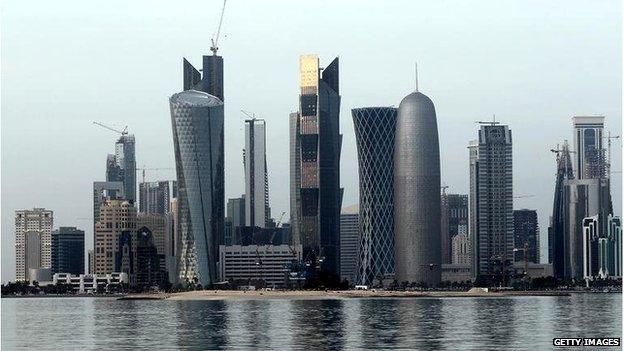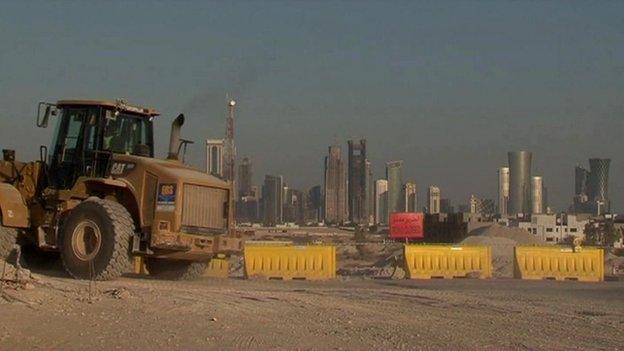Inside Qatar's squalid labour camps
- Published
Many migrant labourers live in unhygienic, overcrowded conditions
The Qatari authorities say they are working to improve living and working conditions for the tens of thousands of migrant workers. But many labourers, mainly from South Asia, find their dream of coming to this rich nation to improve the lives of their families is more of a nightmare.
The Qatari authorities say they have increased inspection of accommodation, but I visited four so-called labour camps in Doha and they were all squalid.
Some were better than others, but they were all overcrowded with around six to eight men to a room.
Twenty and sometimes up to 40 men have to share a kitchen, which is often just a few cooking hobs hooked up to gas canisters and nothing more.
The toilet and washing facilities are so basic and dirty that some men use buckets of water to wash.
One Bangladeshi man said that raw sewage had been leaking into the camp from a broken pipe.
The Qatari authorities say: "There are very many developments for new workers' accommodation in Qatar at various stages of planning and construction, including at Al-Baraha (25,000 beds); and the Barwa Recreation City facility at Al Khor, which will accommodate a further 6,000 workers, and recreational facilities.
"Further private sector developments will create a further 70,000 beds for workers; while enforcement and inspections should help raise the standards of existing accommodation."
'21st Century slave state'
The 2022 World Cup has kicked off a multibillion-dollar construction boom in Qatar, and roads and hotels are being built to accommodate the fans and businesses that will flock to the emirate.
But though Doha, the capital, looks uber-modern, with glittering skyscrapers and innovative architecture, its labour system is less forward-looking.

The lure of Qatar - one of the richest countries in the world - draws thousands of foreign workers
Human rights groups and trade unions say migrant workers are subject to a labour system that enables trafficking and forced labour.
Last year, 185 Nepalese workers died, many from heart failure, and 450 Indian workers have died since 2012. Figures of deaths from other nationalities have not been published.
Indian and Qatari authorities say the death rates are normal.
However, Human Rights Watch called the figures "horrendous" and the general secretary of the International Trade Union Confederation, Sharan Burrow, says it is "an exceptionally high mortality rate".
She says if this trend continues some 4,000 workers will die before the first World Cup football kick-off.
Qatar, she says, has refused to give workers a collective voice or the right to form trade unions, describing the emirate as "a 21st Century slave state".
'People hate us'
Most workers were reluctant to be interviewed, saying they feared getting into trouble with the authorities.
Qatar is a monarchy with restrictions on freedom of speech. But some workers agreed.
In a ramshackle, cockroach-infested camp, 22-year-old Anil Lamichhane told me he regrets coming to Qatar and wants to go home to Nepal.
"My company doesn't care about us. When we complain to our seniors they say, 'We will see, we will see'. But when will they see us? We don't get safety shoes in time, we don't get helmets, we don't get good gloves, we don't get good accommodation, we don't get good food. We don't get good salaries - only $9 per day - and we work six days per week.
"No-one respects our feelings, we are just labour, all people hate us."
At another camp, Santos Tharu from Nepal told me how he is trapped in Qatar without his passport or any money.
He says he injured his back at work carrying heavy loads, but his employer refused to pay his medical bills.

Scores of migrant workers have died working on sites for the 2022 World Cup
"I became so unwell I couldn't get out of bed for a week, so they sacked me. They said they would send me home to Nepal, as my contract says. I waited and waited, but it's been two months now.
"I don't have anything, no wages and no food allowance. I have to rely on my friends," he said.
His employer did not respond to my request for an interview. According to Amnesty International, the majority of migrant workers have their passports held by employers.
Workers' charter
The organisers of the 2022 World Cup issued a "workers' charter" last month in an attempt to improve workers' rights.
But it only applies to those working directly on the World Cup buildings.
According to the Qatar 2022 Supreme Committee for Legacy and Delivery, this currently only applies to 38 workers.
There are more than a million migrant labourers toiling on the infrastructure for the World Cup, building hotels and roads to accommodate the fans and businesses that will flock to Qatar because of the football.
The Ministry of Labour and Social Affairs states: "Where any liability is found to rest with employers, the Ministry of Labour and Social Affairs and Qatari law authorities will pursue these cases through the relevant legal channels.
"Many companies have been sanctioned for labour law violations. This includes 2,000 in the past year, and 500 in January 2014 alone. Ultimately, companies that are sanctioned are stopped from hiring workers or renewing visas."
- Published19 February 2014
- Attribution
- Published11 February 2014
- Published17 November 2013
- Attribution
- Published27 September 2013
- Attribution
- Published13 September 2013
- Published4 October 2013